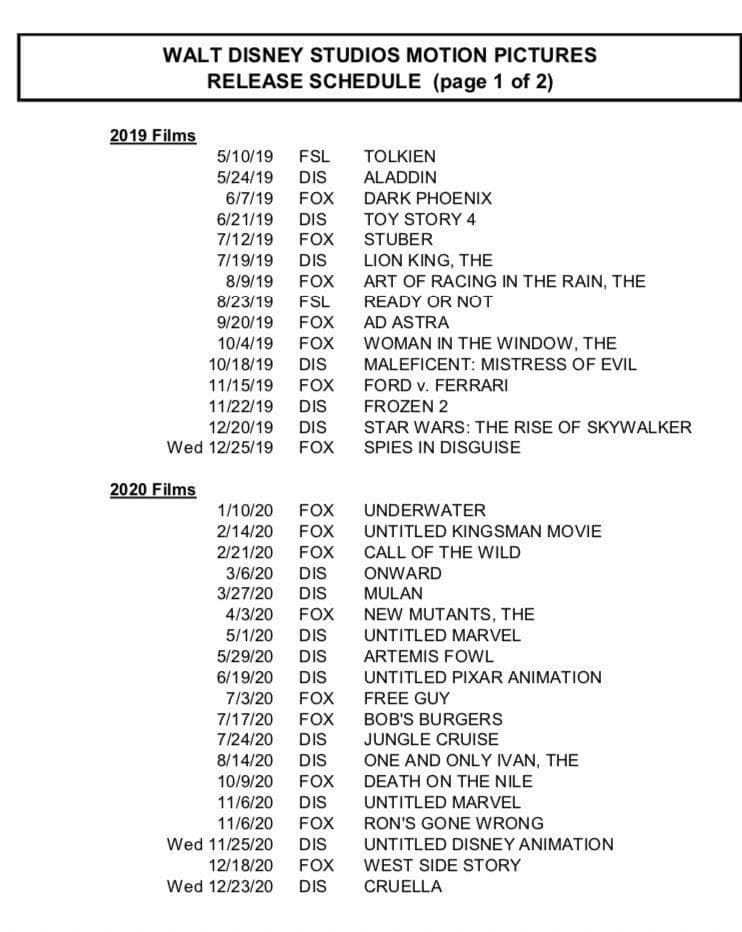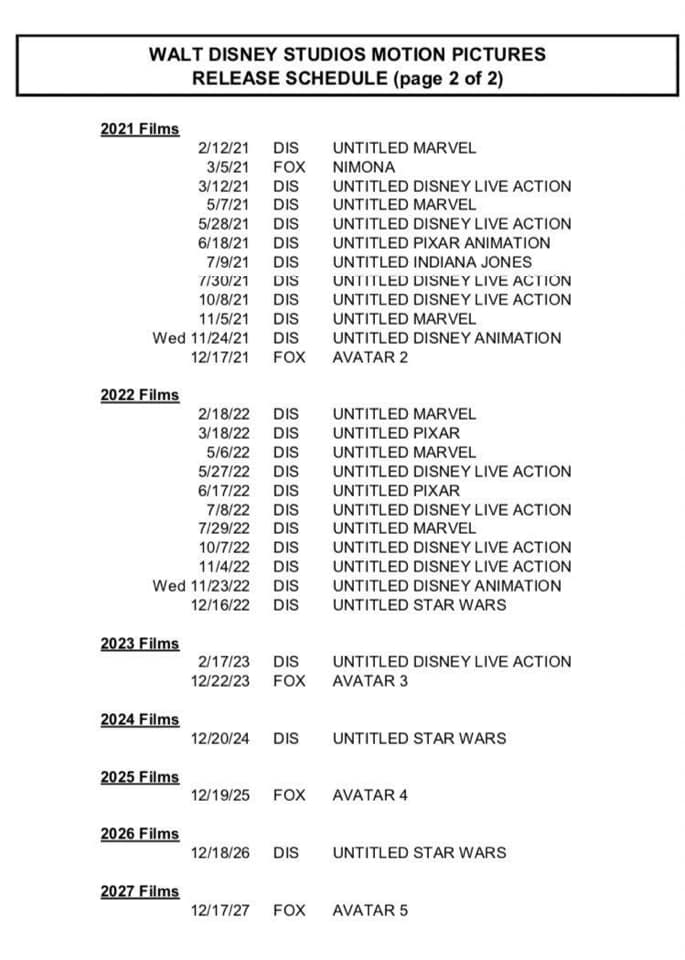LESSON #1: DECORUM AND CIVILITY HAVE SLIPPED AT THE COMMUNAL THEATRE EXPERIENCE— I think every single one of us has more than one story of a crappy theater patron that we’ve had to share a movie with. I bet, combined, we’re seen it all across any and all possible loud, messy, and disrespectful behavior. I ran into a sharp column from Rebel Without a Pause Button blogger Robert Salusbury on this topic entitled “Cinema Slobs.” Reading it (nice media inserts, by the way) makes me wonder not just the extent, which we all know is too much, but the causes of how there is more of this that what many of us remember from past generations. It can’t all be cell phones. A spoiled culture of entitlement, born from increased costs and a negative shift of personal discipline and accountability, has to be in there somewhere. Am I right? Don’t be one of the people we all hate when you go to the movie. Be cool and a good neighbor.
LESSON #2: SONY ISN’T STUPID AND DISNEY IS OVERCONFIDENT— With the same fervor as rooting for the chaos of NBA free agency, I got a kick out of hearing that Marvel could love its MCU rights to the Sony-controlled Spider-Man character if Spider-Man: Far From Home does not crack $1 billion of global box office. I mean, go figure that this is even a risk, but it’s going to be closer than you think. Spider-Man: Homecoming fell far short of a billion at about $880 million, so Disney is gambling on big growth. This makes me laugh for two reasons. The first is the shared horror we all have knowing Sony would f–k up this character for a third time without Marvel’s champion support. The second is how Disney might be shooting its own foot with this necessary milestone by putting The Lion King in theaters right in Spider-Man’s wake in third week. That’s careless hubris right there.
LESSON #3: THERE IS A DIFFERENCE BETWEEN A REMAKE AND A REIMAGINING— Speaking of The Lion King, folks, I know I wrote about 1100 words on the movie, but I honestly don’t know what to truly tell you about The Lion King. Disney calls these reimaginings, but, to me, that term means updates, modifications, and new infusions. Jon Favreau’s has that on the outside with the stunning photo-real animation, but that’s it. There is an awful lot of shot-for-shot replication after that, which feels more remake than reimagining. Granted, if that’s the goal, then mission accomplished because the music is there and the nostalgia is there to make a zillion dollars. Creatively, I still think it’s a shame and a missed opportunity to evolve more than the exterior.
LESSON #4: IT PAYS TO BE AN AVENGER— Here’s one more thing on Disney money. We’ve seen Robert Downey, Jr. score fat paydays for being Tony Stark, but, goddamn, was Avenger: Endgame a golden parachute. The top dog got $20 million up front, which is lucrative and more than the $15 million given to Chris Evans, Scarlet Johansson, and Chris Hemsworth. For RDJ, it’s the 8% back-end deal that fills his vault with another $55 million. That’s a handsome jump from the $500K paycheck from the first Iron Man movie. Studs and studettes, back-end deals are where it’s at (“that’s what she said”) and they’ve been a part of the business for a long time. Jack Nicholson’s Batman deal from 30 years ago scored like RDJ did. Even Bradley Cooper doing just a voice took a 1% deal and walks away from Avengers: Endgame with $7 million.
LESSON #5: NETFLIX MIGHT BE GETTING SMARTER— Frequent WWLTW readers and followers have seen in this column the many instances where Netflix really throws money around (click on the tag and you’ll see). Well, I think the teenager finally maxed out mommy and daddy’s credit card and have learned to live and spend a little leaner. Reports say the streaming giant will be more “cautious” with budgets after dropping nine figures on projects like Ben Affleck’s Triple Frontier and Martin Scorsese’s The Irishman. Welcome to big studio problems, Netflix. It’s the paychecks they’re writing to talent, not the production costs. Unlike an MCU film, they aren’t getting ticket sales. As renewable and reliable as the monthly subscription rake can provide, Netflix will always have a growth cap. Heaven forbid, they lose customers.
LESSON #6: REEVALUATING THE POLITICS OF A MOVIE IS ALMOST ALWAYS PROBLEMATIC— In my short 39 years in this world, I am fully educated and aware that some movies are not going to age well and that, matching my own website of Every Movie Has a Lesson, I believe every movie has a bias or political root of some size. Zero is impossible. To me, each movie becomes a time capsule for the era in which is was made (double if it’s a period piece), slant and all. I get the feeling IndieWire’s Eric Kohn doesn’t see things the same way. For Forrest Gump’s 25th anniversary, the journalist wrote a takedown article heaping a whole lot of conjecture and reaching political blame. I don’t know about you, but I can’t go there. Forrest Gump was always neutral to me because it’s steep realistic fiction. Aging is aging. I get that some movies will fit and fall with the times, but it’s not worth burning things to the ground.
LESSON #7: GUILLERMO DEL TORO HAS GOOD TASTE— For the finishing recommendation slot, enjoy this list of The Shape of Water Oscar winner’s 25 favorite films. It’s an outstanding balance of cinema history and modern cornerstones. Build that Letterboxd checklist from this and begin a little journey of appreciation and education.
 DON SHANAHAN is a Chicago-based and Rotten Tomatoes-approved film critic writing on his website Every Movie Has a Lesson. His movie review work is also published on 25YL (25 Years Later) and also on Medium.com for the MovieTime Guru publication. As an educator by day, Don writes his movie reviews with life lessons in mind, from the serious to the farcical. He is a proud director and one of the founders of the Chicago Independent Film Critics Circle and a member of the nationally-recognized Online Film Critics Society. As a contributor here on Feelin’ Film now for over two years, he’s going to expand those lessons to current movie news and trends while chipping in with guest spots and co-hosting duties, including the previous “Connecting with Classics” podcasts. Find “Every Movie Has a Lesson” on Facebook, Twitter, and Medium to follow his work. (#107)
DON SHANAHAN is a Chicago-based and Rotten Tomatoes-approved film critic writing on his website Every Movie Has a Lesson. His movie review work is also published on 25YL (25 Years Later) and also on Medium.com for the MovieTime Guru publication. As an educator by day, Don writes his movie reviews with life lessons in mind, from the serious to the farcical. He is a proud director and one of the founders of the Chicago Independent Film Critics Circle and a member of the nationally-recognized Online Film Critics Society. As a contributor here on Feelin’ Film now for over two years, he’s going to expand those lessons to current movie news and trends while chipping in with guest spots and co-hosting duties, including the previous “Connecting with Classics” podcasts. Find “Every Movie Has a Lesson” on Facebook, Twitter, and Medium to follow his work. (#107)



